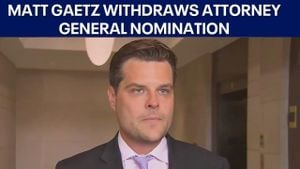President-elect Donald Trump is once again making headlines as he contemplates significant changes to leadership at the FBI. With thoughts swirling about dismissing current director Christopher Wray, insiders reveal Trump is eyeing former FBI special agent Mike Rogers for the top post and possibly placing Kash Patel, known for his hardline loyalty to the MAGA movement, as deputy director.
For months, Trump has expressed his intent to replace Wray if he gained the presidency. The complications of finding the right successor, who can align with Trump's agenda and still achieve Senate confirmation, have muddied the waters significantly. This situation grew increasingly tense after Trump's initial choice for attorney general, Matt Gaetz, withdrew amid his own uphill confirmation challenges. Such setbacks have prompted Trump to dig deep for credible candidates.
Rumors floating around suggest Rogers, who has prior experience as both an FBI agent and a member of Congress from Michigan, might be the winning ticket. His background and recent unsuccessful Senate bid have kept him on Trump's radar. At the same time, the possible choice of Karim Patel as deputy could put the MAGA crowd's anxieties to rest, showing they might influence major appointments.
Support from Senate Republicans has also played heavily on Trump's mind as reports indicate GOP members are wary of drastic changes at the FBI. Nominators are dealing with the balancing act of keeping the Senate's support for such nominations, particularly with Trump’s own agenda being under scrutiny. Former FBI deputy director Andrew McCabe, now serving as a CNN analyst, weighed in, stating Rogers would be "totally reasonable" for the lead role. Yet, he cautioned against giving Patel any leverage within the bureau for reasons he articulated on CNN: "No part of the FBI's mission is safe with Kash Patel in any position of leadership... It’s inconceivable for someone entirely outside the organization to perform adequately."
Despite the buzz, nothing is set until Trump spills the beans himself, usually through his preferred platform, Truth Social. He’s known for frequently shifting between candidates during discussions, as many names flow through his circle, being added or removed from the potential shortlist on whims.
While Patel has made waves for attempting to secure the director role, which could provide him with the clout to pursue investigations against Trump’s perceived adversaries, sources familiar with the transition process have described his possible promotion as alarming. Patel's links to past actions, including disregarding traditional processes by trying to expose classified information, could suggest troubling times at the Bureau if he ascends.
Historically, Patel has shown interest in upward mobility within government ranks and has been connected to proposals for positions within the CIA and FBI during Trump’s earlier term, only to be advised against such moves by then Attorney General William Barr due to the non-political nature of those roles. The stakes are clearly higher this time around, emphasizing how appointments at such high levels have far-reaching consequences.
Given Trump's previous tenure and the drama surrounding his administration, this potential reshuffling at the FBI has many watching closely. The conundrum remains whether Trump can placate both his allies' desires for more control over the FBI and the GOP's need for stability within such institutions. With the political climate heated and scrutiny sharper than ever, the eyes of the nation are set to be fixed on Mar-a-Lago as potential appointments draw nearer, highlighting both political maneuvering and the tension inherent within the intersection of law enforcement and partisan politics.
The possible appointments are surrounded by factions; on one side are moderate voters and GOP members who prefer steady hands at institutions like the FBI. On the other, there’s the relentless push from America First proponents demanding significant shifts.
These dynamics present a tricky tightrope for Trump to navigate, especially amid rising critiques from both ends of the political spectrum. Advisers have noted how any misstep on this front could ripple throughout the 2024 election shaping the G.O.P.'s posture toward law enforcement agencies.
Despite the rigorous back-and-forth and speculation about the possibilities, one thing appears clear: whatever choices emerge from Trump's decision-making, they'll likely reverberate through the legal community and Trump’s political ambitions as he seeks to regain the White House.
Firing Wray is one piece of the puzzle, but finding the right leadership to replace him could very well shape the FBI’s role on the national stage, especially considering Trump’s history with the Bureau—a mixture of admiration for its work and frustration toward how its efforts often intersect with his objectives. What happens next at the FBI could serve as yet another chapter in the storied narrative of Trump’s complicated relationship with law enforcement.



